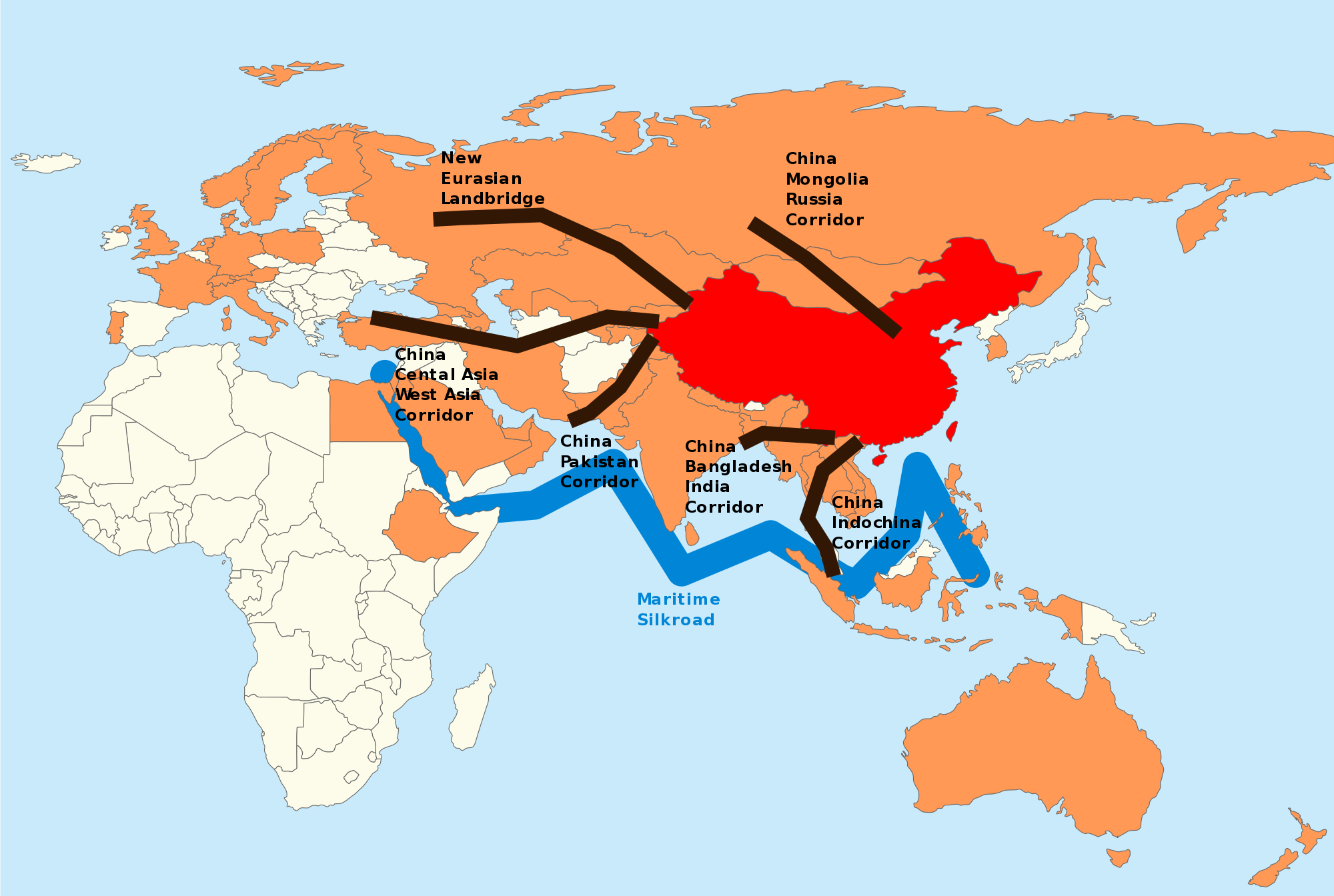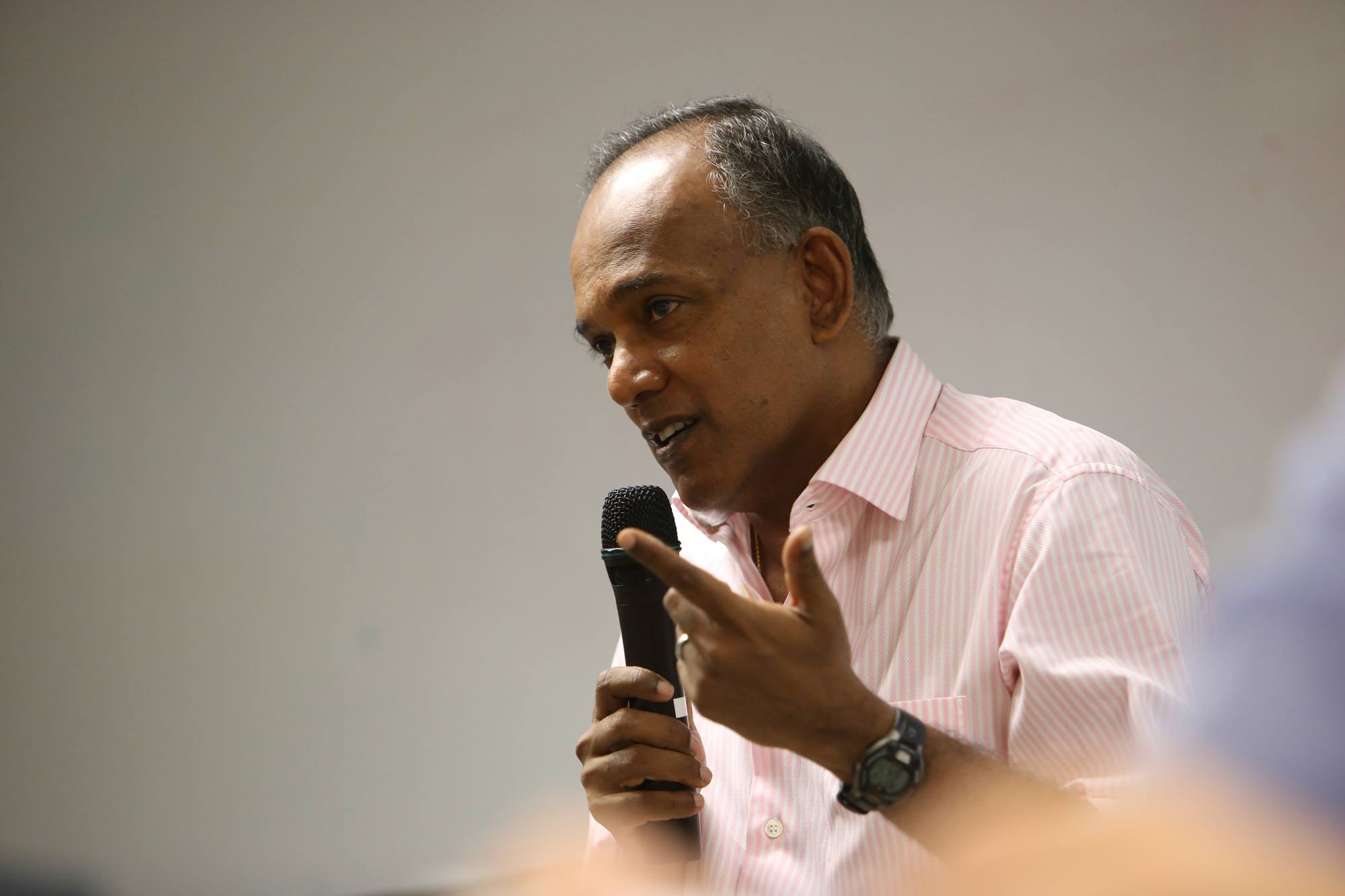The "One Belt, One Road" (OBOR) initiative is an epic project that is the brainchild of China's president Xi Jinping.
In short, it's a plan, first proposed in 2013, for a China-centred trade network connecting it with countries like Russia, Turkey, Singapore, Pakistan, Myanmar and the Mediterranean. It will eventually link as many as 60 countries, mostly from Asia and Europe, and will cost China up to US$8 trillion to build.
It'll look something like this:
 Source: Wikimedia Commons
Source: Wikimedia Commons
Even though this is quite clearly a foreign affairs issue, it was ex-foreign minister and current Minister for Home Affairs K Shanmugam, and not current Foreign Affairs Minister Vivian Balakrishnan, who gave it on Monday morning, at the 2017 Asia Economic Forum at the National University of Singapore.
We're not sure why, but hey, it's as much a signal as any that this speech is pretty darn important.
So here's a rundown of the points he made about it:
1. The OBOR will reshape global trade
Calling it "the spine of World Trade", Shanmugam argued that it is important for us to see history from a different perspective than the generally Western-centred world view taught in schools.
"China, India, Japan are in the top 10 economies in the world in terms of GDP. ASEAN, as a single economic unit, is also in the top 10. OBOR will anchor the world's centre of economic gravity in Asia. And China will be the centre of that centre.
Not all roads will lead to Beijing, but many roads will. This is on the assumption that the major economies of Asia work together, there is no trade war and no alliances which face off against each other."
2. China's bid for superpower status is realistic
Shanmugam acknowledged that China will soon enough rise to become the largest world economy in absolute terms, though not in per capita terms.
"Technologically, militarily, China will become a more significant player over the next 20 to 30 years. China aims to be a superpower, understandably. When you consider the combined metrics of economy, technology and population, you will conclude that China's aim to be a superpower is realistic.
...
China is fast drawing level with the most advanced countries, in many fields, and surging ahead in some. Its infrastructure, technology, education system are now better than world class.
Despite all the criticisms it receives, China has lifted 700 million people out of poverty within 30 years. A feat unparalleled in history."
Citing other examples on China's science and technology development and long-term commitments on investments and economic relationships, he explained that China has been proving its critics wrong, especially on the variants of arguments relating to the dominance of the Chinese Communist Party.
3. The power balance between the U.S. and China will shift
Although careful to stress that the U.S. is nowhere near going into decline, Shanmugam said the balance of power is soon shifting in favour of China.
"It is more a question of relativity. The relativities have already changed, and will continue to change. In absolute terms, it will be some time yet before China or any other country can match the U.S., let alone surpass it, militarily.
The U.S. has a significant lead today. Its capabilities are huge, and its ability to project its power around the world impressive — indeed, unprecedented in world history. Nevertheless, over time, the U.S. will have less and less scope for unilateral actions especially in the areas of the globe where China has strong interests.
And China will not be able to ignore U.S. interests either, even as its power increases. They will have to find a new Modus Vivendi. I don't see any of these as particularly controversial conclusions."
Referencing the shift in the previous American position and how America engages the world, i.e. the "America First" approach, he said that the U.S. foreign policy terms are not yet clear.
"If the U.S. continues with anti-trade rhetoric, removes itself from trade agreements, targets countries with economic sanctions, there are tariff wars, then more countries may find the OBOR to be more attractive".
But, he continued, China will not be able to ignore the interests of the U.S. either.
4. China must also work with anti-OBOR countries
Shanmugam also cautions that China must navigate its relations with countries not as supportive of OBOR carefully if it wants to prevent the formation of anti-China or OBOR alliances.
"China also has to try and engage countries which have been less than enthusiastic about OBOR — for example, India and Japan.
China, being so big and successful, should take steps to assure, engage, recognise that its actions will have a lot of impact, because of its size, heft and impact.
It is good for China to be respected, liked and trusted. Because the starting point is that actions of a very big country will be keenly analysed by others.
If there is a deficit in trust, we then might see regional counter blocs forming, for example India and Japan, perhaps with powers outside Asia."
[related_story]
5. The OBOR project comes with risks, too
While acknowledging the wonders the OBOR project will work for trade, Shanmugam warned of threats that come with it, including the fact that:
- The route enhances connectivity between extremists, and Jihadist influences
- Countries along the Silk Road route have long been conflict-ridden and difficult to maintain peace, law and order — essential for trade
- Central Asian countries are still young and developing, and may see changes in leadership which in turn lead to changes in policy that may affect trade agreements
- Other countries involved would likely also move to assert their interests, which may not align with China's
"For OBOR to succeed, you need the globalised economy to function. This means that there must be no trade wars between China and the U.S.".
He also emphasised that the OBOR is "not a substitute for the current international order".
6. Singapore is poised to benefit from the OBOR
Singapore has been supporting the OBOR since the early years of its inception, and it is in our interest to maintain good relationships with the rest of the world.
"There will be fierce competition, certainly. We must expect, anticipate that our neighbours will, for example, want to build big ports, challenge our port, as they have every right to do so. And we must be nimble, quickly adapt, modernise, expand our own container port, have the foresight to make the necessary changes today for a better tomorrow, as we have done in the past."
He stressed that we must be paranoid about our competitors, and not allow ourselves to be bullied by big powers.
Most importantly, he added (and we see what he did there), we must not behave like a small state:
"If our founding fathers had conceded Singapore should behave like a small state, we would not be having this conversation today."
Here are some totally unrelated but equally interesting stories:
These S’poreans prove that you don’t need superpowers to be a hero
An East-sider’s guide to spend a day like a tourist in the east
If you like what you read, follow us on Facebook, Instagram, Twitter and Telegram to get the latest updates.


